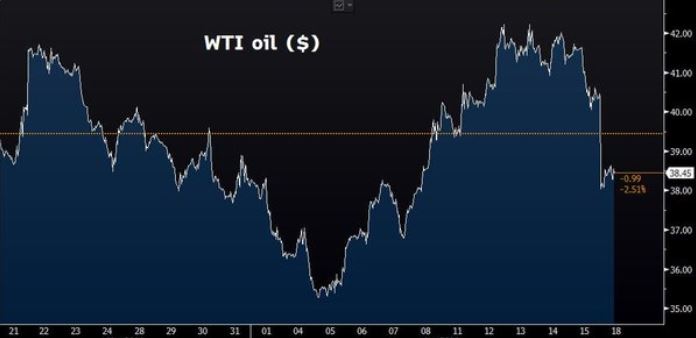
Oil Falls Again As Crunch Meeting Fails to Agree Deal
They came. They talked. They talked some more. They failed to reach a deal. And so the turmoil within the global oil industry continues.
 They came. They talked. They talked some more. They failed to reach a deal. And so the turmoil within the global oil industry continues.
They came. They talked. They talked some more. They failed to reach a deal. And so the turmoil within the global oil industry continues.
Yesterday’s crunch meeting in a plush hotel in Doha, where sixteen of the world’s leading oil producers tried to broker the first deal for fifteen years, failed not because of who was in the room, but because of one notable absent guest: Iran.
As Saudi Arabia insisted that any deal had to include Iran, the fact that Iran did not turn up meant that no deal was possible. This means that a production freeze – which could have brought stability – will not happen.
Iran meanwhile is annoying its Arab neighbours by saying it will carry on increasing oil production due to the lifting of sanctions. The Iranian Government said: “As we’re not going to sign anything, and as we’re not part of the decision to freeze output, we ultimately decided it was not necessary to send a representative.”
The markets have reacted badly.
In early trading this morning in Asia, the oil price was down by up to 7 per cent, although it recovered slightly. The international oil benchmark Brent plummeted by over 5% to $40.87 a barrel. US crude futures fell 5.5% at $38.16 a barrel.
The recriminations have already started.
Delegates had expected Saudi Arabia to sign off any potential deal, even if Iran was not there, but this did not happen. “We are very very disappointed,” said Falah Alamri, the Iraqi representative. “This will affect the [oil] price and our earnings. We wanted a deal.”
Aleksandr Novak, Russia’s Energy minister, added “I thought countries that came here, came to agree and not to discuss the need of joining in of those countries that were not participating. We had been disputing today a lot, and that was because some countries from OPEC changed their positions in the morning.”
Analysts were scathing too. Bernard Aw, market strategist at IG Markets Singapore said “Expectations for the talks to end with an agreement were high, and the lack of one damaged the credibility of future meetings to support the oil market.”
Sanjeev Gupta, an oil and gas analyst at EY, added that failure in Doha “revived price collapse fears especially after Saudi Arabia hardened its stance and threatened to raise production quickly if no freeze deals were reached”.
One analyst Peter Lee, an oil and gas analyst BMI Researchm, went as far as to warn that the oil price could plunge 15 per cent due to the Doha failure.
All eyes are now on Opec’s next meeting in June.
